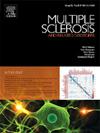Body mass index is unrelated to the response to autologous hematopoietic stem cell transplantation in persons with multiple sclerosis
IF 2.9
3区 医学
Q2 CLINICAL NEUROLOGY
引用次数: 0
Abstract
Background
Multiple sclerosis (MS) is a chronic autoimmune disorder that compromises the central nervous system; it is characterized by inflammation, demyelination, and neuronal degeneration. Its complex etiology involves genetic, environmental, and lifestyle factors, with emerging research highlighting the importance of nutritional status, particularly the body mass index (BMI), in disease progression. While BMI has been linked to other neurodegenerative conditions, its specific impact on MS remains unclear.
Objective
This study aims to analyze the association between patient BMI and the response to autologous hematopoietic stem cell transplantation (aHSCT) and disease progression, as reflected by changes in the Expanded Disability Status Scale (EDSS) 12 months post-transplant. The goal is to determine whether BMI influences treatment response and determine potential predictors of outcomes in MS patients undergoing autologous HSCT.
Methods
We conducted a retrospective study of 457 patients with MS who underwent autologous HSCT between May 2015 and June 2023. Patients were classified into BMI categories: underweight, normal weight, overweight, and obese. Response to HSCT was assessed by changes in the Expanded Disability Status Scale (EDSS), 3- and 12-months post-transplant. A positive response was defined as EDSS stabilization or improvement.
Results
The cohort included 16 underweight, 227 normal weight, 138 overweight, and 76 obese patients. Overall, 77 % of patients responded positively to HSCT: the median EDSS score decreased from 5.5 (IQR 3.5–6.5) to 5.0 (IQR 2.5–6.5) (p = 0.0049). Positive responses were observed in 100 % underweight, 75 % normal-weight, and 75 % overweight patients, with no significant differences in response rates across BMI categories.
Conclusion
BMI was not associated with the clinical response to autologous HSCT in MS patients. These findings suggest that the efficacy of aHSCT is independent of BMI, although further studies are needed to explore the broader implications of BMI on treatment outcomes.
体重指数与多发性硬化症患者对自体造血干细胞移植的反应无关
背景:多发性硬化症(MS)是一种慢性自身免疫性疾病,损害中枢神经系统;它的特征是炎症、脱髓鞘和神经元变性。其复杂的病因涉及遗传、环境和生活方式因素,新兴研究强调了营养状况,特别是身体质量指数(BMI)在疾病进展中的重要性。虽然BMI与其他神经退行性疾病有关,但其对多发性硬化症的具体影响尚不清楚。本研究旨在分析患者BMI与自体造血干细胞移植(aHSCT)反应和疾病进展之间的关系,通过移植后12个月扩展残疾状态量表(EDSS)的变化来反映。目的是确定BMI是否影响治疗反应,并确定接受自体造血干细胞移植的MS患者预后的潜在预测因素。方法对2015年5月至2023年6月期间接受自体造血干细胞移植的457例MS患者进行回顾性研究。将患者分为体重指数:体重不足、体重正常、超重和肥胖。移植后3个月和12个月,通过扩展残疾状态量表(EDSS)的变化来评估对HSCT的反应。积极反应被定义为EDSS稳定或改善。结果16例体重过轻,227例正常体重,138例超重,76例肥胖。总体而言,77%的患者对HSCT反应积极:中位EDSS评分从5.5 (IQR 3.5-6.5)降至5.0 (IQR 2.5-6.5) (p = 0.0049)。在100%体重过轻、75%正常体重和75%超重的患者中观察到阳性反应,不同BMI类别的反应率无显著差异。结论bmi与MS患者自体造血干细胞移植的临床反应无关。这些发现表明,aHSCT的疗效与BMI无关,尽管需要进一步的研究来探索BMI对治疗结果的更广泛影响。
本文章由计算机程序翻译,如有差异,请以英文原文为准。
求助全文
约1分钟内获得全文
求助全文
来源期刊

Multiple sclerosis and related disorders
CLINICAL NEUROLOGY-
CiteScore
5.80
自引率
20.00%
发文量
814
审稿时长
66 days
期刊介绍:
Multiple Sclerosis is an area of ever expanding research and escalating publications. Multiple Sclerosis and Related Disorders is a wide ranging international journal supported by key researchers from all neuroscience domains that focus on MS and associated disease of the central nervous system. The primary aim of this new journal is the rapid publication of high quality original research in the field. Important secondary aims will be timely updates and editorials on important scientific and clinical care advances, controversies in the field, and invited opinion articles from current thought leaders on topical issues. One section of the journal will focus on teaching, written to enhance the practice of community and academic neurologists involved in the care of MS patients. Summaries of key articles written for a lay audience will be provided as an on-line resource.
A team of four chief editors is supported by leading section editors who will commission and appraise original and review articles concerning: clinical neurology, neuroimaging, neuropathology, neuroepidemiology, therapeutics, genetics / transcriptomics, experimental models, neuroimmunology, biomarkers, neuropsychology, neurorehabilitation, measurement scales, teaching, neuroethics and lay communication.
 求助内容:
求助内容: 应助结果提醒方式:
应助结果提醒方式:


